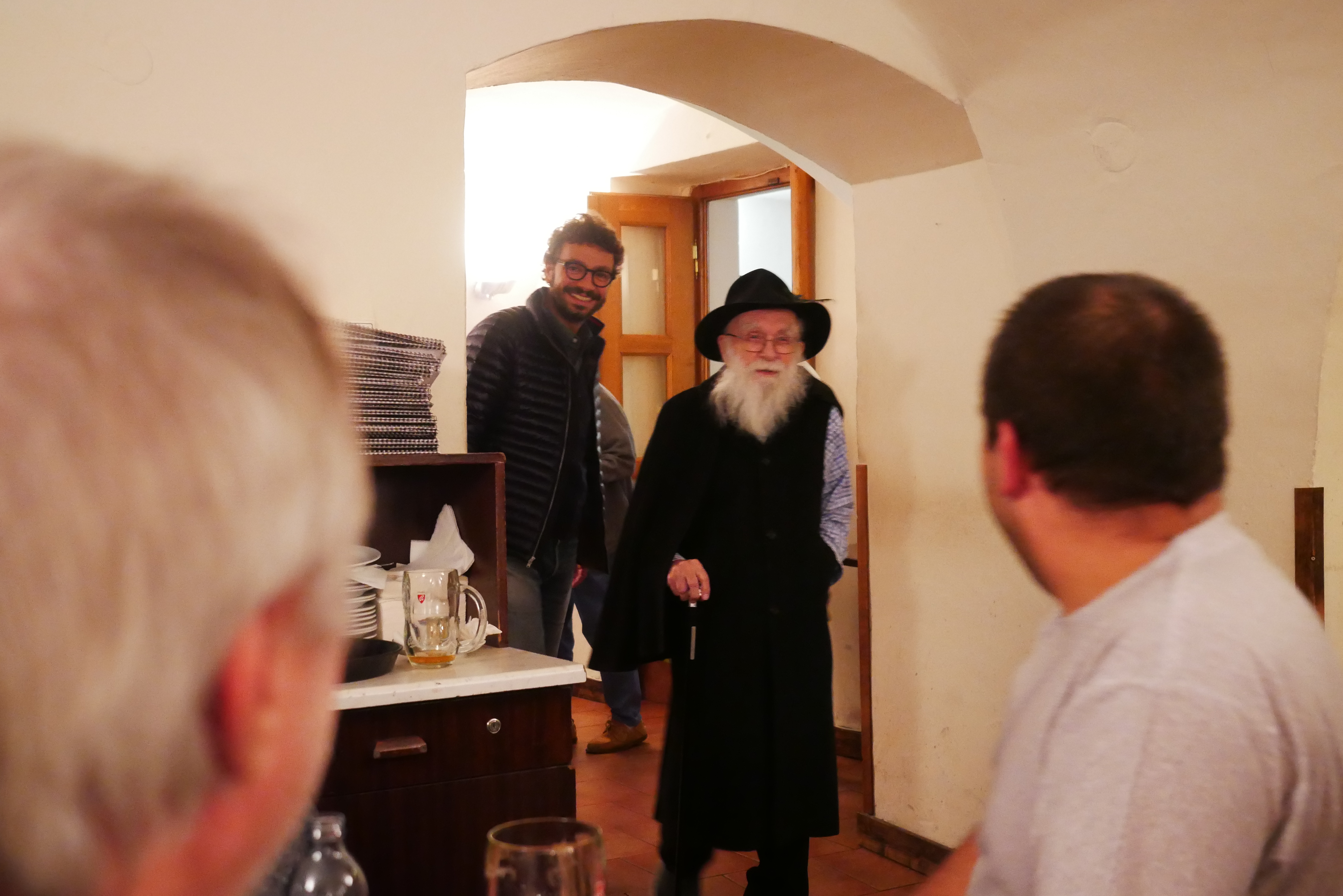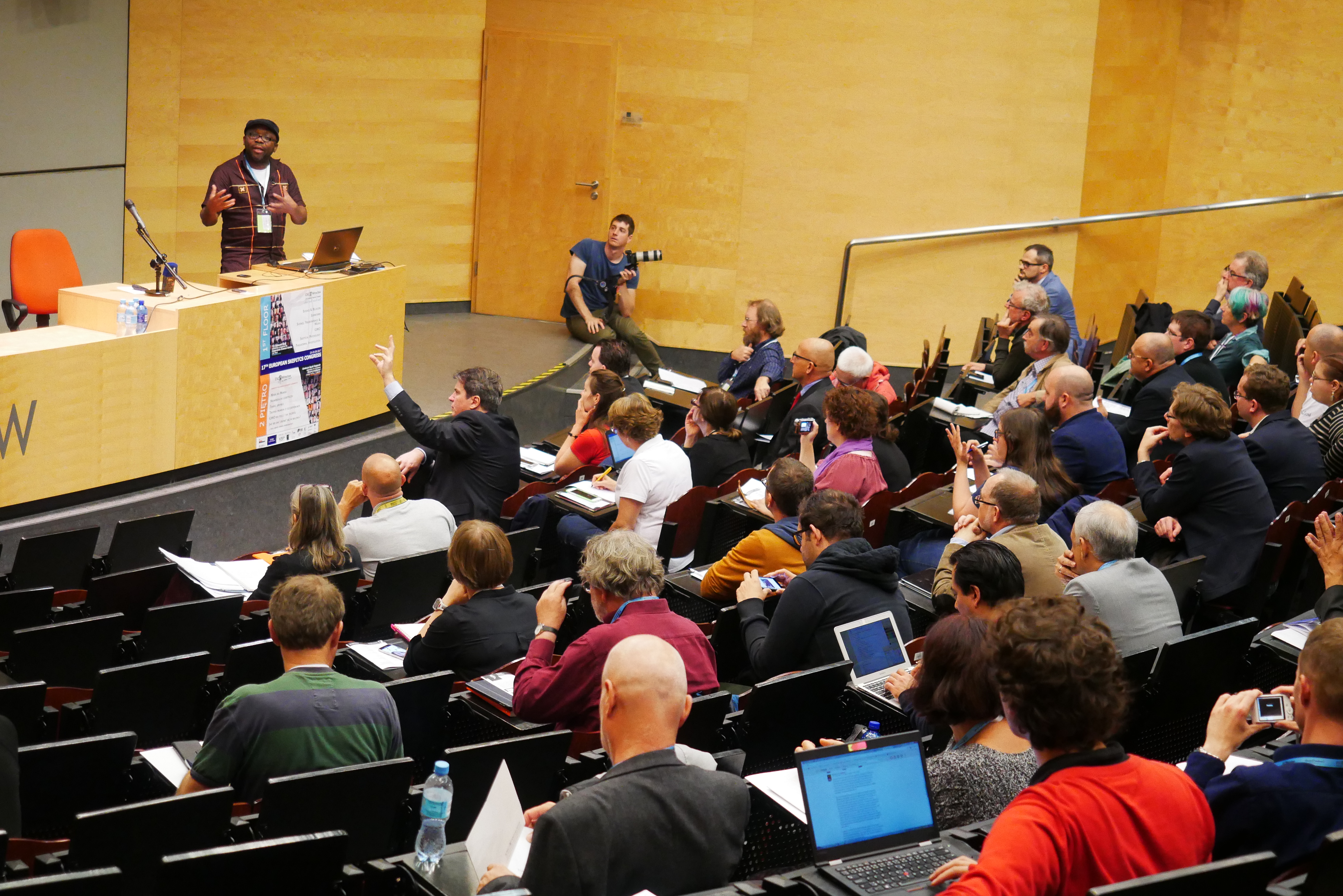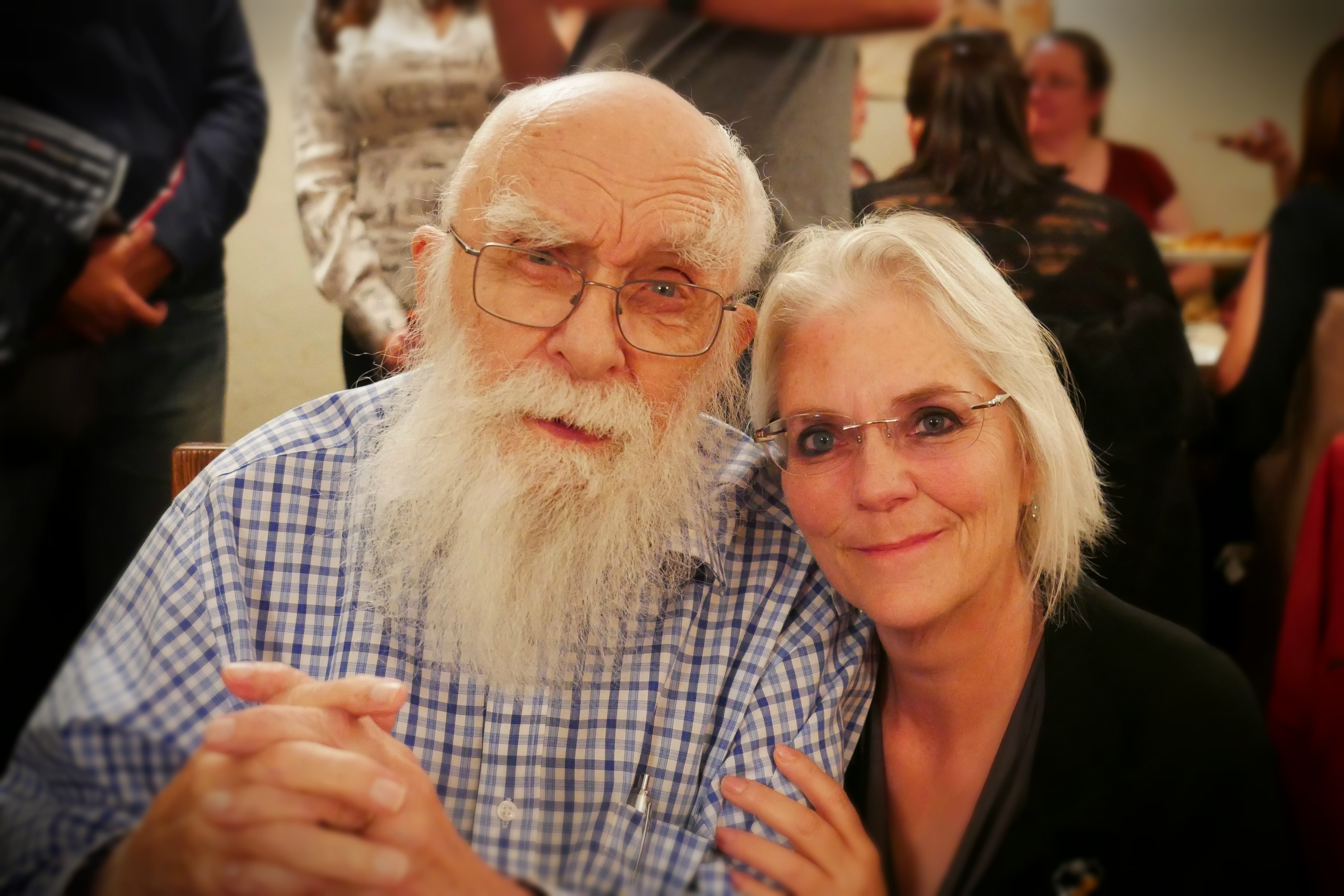
This article is the second of five articles, chronicling the adventures of my month long European About Time Tour. This tour was funded by the individual skeptical organizations and by private donations. This second leg of the journey was in Prague, the Czech Republic, and Wrocław, Poland; along with me was psychic expert and mentalist Mark Edward. We had very limited time in the area; only five days.
Mark Edward and I arrived in Prague at 8 a.m.;, we were exhausted. What a beautiful city with a rich history that we saw only a fragment of; I’m going to have to go back. Sleep won out, plus I had booked a hotel room with a washing machine, another necessity of travel. Sisyfos had arranged for free public lectures in Prague in advance of the conference, Mark and I managed to attend part of GSoW editor Leon Korteweg’s talk on science-based veganism, titled “The Good, the Bad and the Unknown”. Leon explained how some of the claims made within the vegan community are not supported by scientific evidence, and sometimes even dangerous. He said that some claims are harming the credibility of what could be a healthy lifestyle – also benefitting animal welfare and the environment – as long as it is appropriately planned. That starts by separating fact and fiction about diets.

Thursday morning, we brought our luggage and ourselves to the Club Sisyfos “Skepticism for Breakfast” event. There we met with more conference speakers: Diego Fontanive, Jakub Kroulik, András Gábor Pintér, Amardeo Sarma, Petr Jan Vinš, and Gerald Ostdiek as well as conference attendees. About thirty of us boarded a bus that took us through the beautiful countryside of the Czech Republic into our destination in Wrocław, Poland.
The goal was to attend the seventeenth European Skeptics Congress (ESC) organized by Klub Sceptyków Polskich (Polish Skeptics Club) and Český klub skeptiků Sisyfos (Czech Skeptic’s Club). The ESC has been held every two years since 1989, each time hosted by a different member of the European Council of Skeptical Organisations (ECSO). CSICOP was actively involved in the formation of the ECSO in 1994. The president of ECSO at the beginning of this conference was Hungarian Skeptic Society President Gábor Hraskó.
Klub Sceptyków Polskich (KSP) was founded in 2010 and has engaged in many activities including the 2011 10:23 Homeopathy overdose campaign. In 2012, KSP organized a four-day protest against the ink blot Rorschact test that is used in the Polish court system; the campaign was called “Psychology is science, not witchcraft.” The Board of Directors are Tomasz Witkowski, Andrzej Gregosiewicz, Wojciech Pisula, Maciej Zatoński and Adam Wierzbicki.
The Český klub skeptiků (Sisyfos) was founded in 1994 with its headquarters in Prague. They publish the Sisyfos newspaper online, organize lectures called Věda kontra iracionalita (Science vs Irrationality) as well as publish skeptical book collections. They award the Bludný balvan (Erratic Boulder) award to individuals or societies that mislead the “Czech public and the development of a muddy way of thinking.” Their newsletter, Neperiodický zpravodaj občanského sdružení Sisyfos (Non-periodical Report of the Sisyfos Organization) is published free of charge a few times a year and is available on their website.
The conference was held in the very beautiful area of Old Town Wrocław, Poland. I think most of the attendees who did not live in Poland had not heard of Wrocław before; I sure hadn’t. There was a lot of interest in how to actually pronounce the city; European Skeptic Podcaster, Pontus Böckman recorded people struggling to pronounce it. The Old Town area had pubs, shops, and art everywhere you looked. The city’s theme are dwarfs. Small bronze figurines can be found all over the area; some are quite humorous. Tomasz Witkowski gave me a small figurine holding a flower, and it sits on my desk now as I type this; such great memories.
The organizers had a brilliant idea to do workshops for the public, for free, and in Polish. These workshops ran the same time as the skeptic congress in a different area, so I don’t know how well attended they were; I do hope they were recorded for later release. I was told that these workshops were aimed at adults as well as kids, and many were Skepticism 101. Some of the titles were “Quantum Mechanics vs Common Sense,” “What can we infer from children’s drawings,” “Mission to Mars,” and “Straight answers to question, how not to get shafted?”. I include a link here for anyone interested. I also want to mention that there was a team of volunteers led by Urszula Zadorożna that made sure everything ran smoothly.
Also in the building where the main lectures were happening, the whole downstairs floor had hands-on science exhibits open for anyone to explore that were also free. I was very impressed with all the outreach done by KSP and Sisyfos. One Polish video channel Racjonalista.TV (Rationalist TV) interviewed most of the speakers before the Congress to improve attendance. I had a lovely conversation with Kaja Bryx a month before the conference and later met her and her partner Jacek Tabisz at the conference.
The way the Congress lectures were organized differently than I’ve seen at other skeptic conferences where there is rarely a theme. They had four lectures followed by a panel with those speakers discussing the theme. In some cases they added panel members who had not been lecturers. It was quite interesting, and discussions were terrific. The themes and speakers were as follows:
Friday morning – Science & Religion – Lecturers were Konrad Talmont-Kamiński, Gerald Ostdiek, Petr Jan Vinš, and Leo Igwe. The panel was chaired by Hraskó Gábor.
Friday afternoon – Exorcisms – Mariusz Błochowiak, Konrad Szołajski, Jakub Kroulík. Chris French joined the panel which was chaired by Amardeo Sarma.
Saturday morning – Science, Pseudoscience & Media – András Gábor Pintér, Ovidiu Covaciu, Diego Fontanive, Sofie Vanthournout, Eran Segev, and Susan Gerbic. The panel was chaired by Pintér.
Saturday afternoon – GMO – Mark Lynas, Marcin Rotkiewicz, and Tomáš Moravec.
Saturday evening – Skeptical Psychology – Susan Blackmore, Scott Lilienfeld, Zbyněk Vybíral. Tomasz Witkowski joined the panel which was chaired by Michael Heap.
Sunday morning – Paranormal Investigation – Deborah Hyde, Holm Gero Hümmler, and an interview with James “The Amaz!ng” Randi by Massimo Polidoro.

This was not a typical skeptic conference, at least nothing that I had ever been to before. Petr Jan Vinš is a Priest from the Old Catholic Church and talked about bringing more critical thinking to religion, which during the panel discussion, Leo Igwe was sternly polite with his comments about not talking down to religious people and embracing science. The exchanges and energy from that panel were something to behold. I hope the videos do it justice.
Also following with the theme of religion, we moved into exorcisms. I had no idea that this was still a “thing” in 2017; most people I talked to agreed with me. Apparently, it is a very big deal in Poland, and our first speaker on the subject was Mariusz Błochowiak the editor of a magazine (he brought an issue for everyone) called Egzorcysta (Exorcism). This is a monthly well-produced magazine with great photography, articles, and profiles of Priests. If my money converter is correct, it costs $3.28 an issue. Błochowiak’s lecture was called “Rational justification for the existence of the devil and the exorcism.” I and everyone I talked to thought it was a parody or a skeptical talk. But partway through the lecture we realized that he was completely serious. This is before we saw the magazine. Looking at my notes from his lecture, I see that I wrote, “The Devil is an angel, who does not obey physics, he has free will (as do humans) and he chooses to be evil and harm humans. The Devil is possible because some scientists believe in the multi-verse theory … we cannot research the Devil because he can change and fool us.” Błochowiak knew ahead of time what kind of conference this was; he was polite and patient answering question after question in the panel and afterwards. He was very open to discussion, and in fact his last slide from his lecture said, “Let’s continue this over a beer.” Some people in the audience made snarky statements but mostly the questions were curious and polite. At one point in the day, there was a problem with a computer issue on stage, so organizers took an opportunity to bring Błochowiak back to answer more questions. I have most of that exchange here. Eran Segev recorded an interview with Błochowiak for the Skeptic Zone.
Filmmaker Konrad Szołajski showed the audience a Polish documentary he produced called “The Battle with Satan” that was captioned in English. I’m not sure if it has been released yet. It followed several people who believed that their life problems could be cured by exorcisms. It was excruciating to watch, and I and others had many problems and comments about what we were witnessing. The discussion after that was again very energetic. After the conference, I asked attendees what were the lectures that stood out, that they were surprised at or learned something from, and over and over the response was the Exorcism lectures.
Within the skeptic community, there has been a lot of discussion to leave lectures about religion out of the conference. Only when the discussion turns away from beliefs to actual claims should we “go there.” All I know was that this was a very popular segment and really got hearts beating and discussion going. It was fascinating to watch audience members interact with Błochowiak, who stayed for the whole conference and asked questions like a normal attendee. I completely enjoyed it. And it was terrific to learn about something that I had no idea was still an issue.
Turning to my project, Guerrilla Skepticism on Wikipedia (GSoW) and the ESC, we had a lot of influence. Over the past three years, GSoW editor Leon Korteweg has led the team in writing the Wikipedia page for the main organization European Council of Skeptical Organisations (ECSO), not only in English, but in Dutch, Spanish, French, Italian, Hungarian, German, Polish, and Portuguese. Then GSoW (again led by Leon) went through and created Wikipedia pages for many of the European skeptic groups associated with ECSO and made sure they were written in multiple languages. And if that wasn’t enough, GSoW wrote Wikipedia pages for the president of ECSO Gábor Hraskó and other leaders in the groups. In total GSoW is responsible for thirty-five Wikipedia pages associated with ECSO related topics. And those thirty-five pages have received 165,548 pageviews as of this writing.
I gave my March for Science – What Next lecture. Because of computer problems, my PowerPoint notes did not exist, and the slides were out of order from what I practiced. So, I had to “wing it.” Turns out it was my best lecture ever with many people in the audience tearing up, including myself when I talked about my team and the importance of having our scientist’s backs. I did coin the phrase “Pseudoscience Placebo Hickey” for Cupping Therapy.
Let’s push this relationship of GSoW’s involvement in the conference a bit further. Editor Adam Kumiszcza wrote and translated multiple Wikipedia pages for speakers at the conference. All of those received pages in Polish, which makes sense considering we were speaking in Poland. The amount of work my editors do behind the scenes, without fanfare, without pay, simply because it needs to be done, amazes me. I’m so proud of my team; you can’t imagine how much so. I had many GSoW editors attend the conference, leaving inspired by the speakers. We had four new people join GSoW after hearing my lecture; Hungarian, Finish, and two Polish editors.
On Saturday night, attendees took a river cruise with dinner, mentalism by Mark Edward and music by Jan Smigmator and Band. It was great fun and great conversations. The view of the Polish buildings along the river were spectacular. Kaja Bryx and Jacek Tabisz were very kind and explained what all the buildings were as well as some of the history of the location to me. As I said, I’m going to have to go back and visit Wrocław again. At one point in the cruise, Mark Edward, James Randi, and I were squished in a corner for an hour while waiting for the cruise to end. What a spot I was in; I turned my video camera on and recorded these two old friends talking magic, story after story. We were joined by more people, and Kirill Verona showed us a trick he has been working on. I was able to just sit back and watch this talent; I had no reason to say a thing. If you like random unplanned videos from the conference you will find them here on my channel.

Claire Klingenberg told us at the conclusion of the congress that this had the biggest attendance of any of the prior sixteen events, with over 250 people attending. The ECSO met at the end of the conference and new leadership was elected. Claire Klingenberg took over as president from Gábor Hraskó. Vice-president is Tim Trachet. Amardeo Sarma is treasurer; Paola De Gobbi and Pontus Böckman are members. Catherine de Jong, Leon Korteweg, Michael Heap, and András Gábor Pintér are associate members. In an interview with Eran Segev for the Skeptic Zone podcast, Klingenberg said that the conference “went great … quite productive and stimulating.” When Segev congratulated her on her new role as president of ECSO, he asked her what her top priority for ESCO was. Her answer was, “make ECSO important … it has to be more relevant, more influential … and seen as a partner not just with European skeptics, but with organizations all over the world.”
For more information about the conference, speakers, and impressions there are many places to explore; subscribe to the ESC European Skeptics Congress YouTube channel so you don’t miss the lectures as they are uploaded. The European Skeptic podcast has done many interviews with speakers and attendees. Eran Segev also has many interviews on the Skeptic Zone podcast. I already mentioned the videos from my YouTube channel as well as the video interviews with speakers from Racjonalista.TV. But here is one more: an interview with GSoW editor Adam Kumiszcza for Racjonalista.TV all in Polish.

My next article on this About Time tour is about our car ride through Germany and Switzerland and the lectures and people we met along the way.
Corrections: Marcin Rotkiewicz was incorrectly credited as the editor of an exorcism magazine and for giving a lecture on exorcism, that was Mariusz Błochowiak. Marcin Rotkiewicz is a member of the Polish Sceptics Club and gave a talk on GMO’s. Also corrected the name of the ESC YouTube channel. Petr Jan Vinš is from the Old Catholic Church. Also I added mention of Leon Korteweg’s lecture in Prague.



